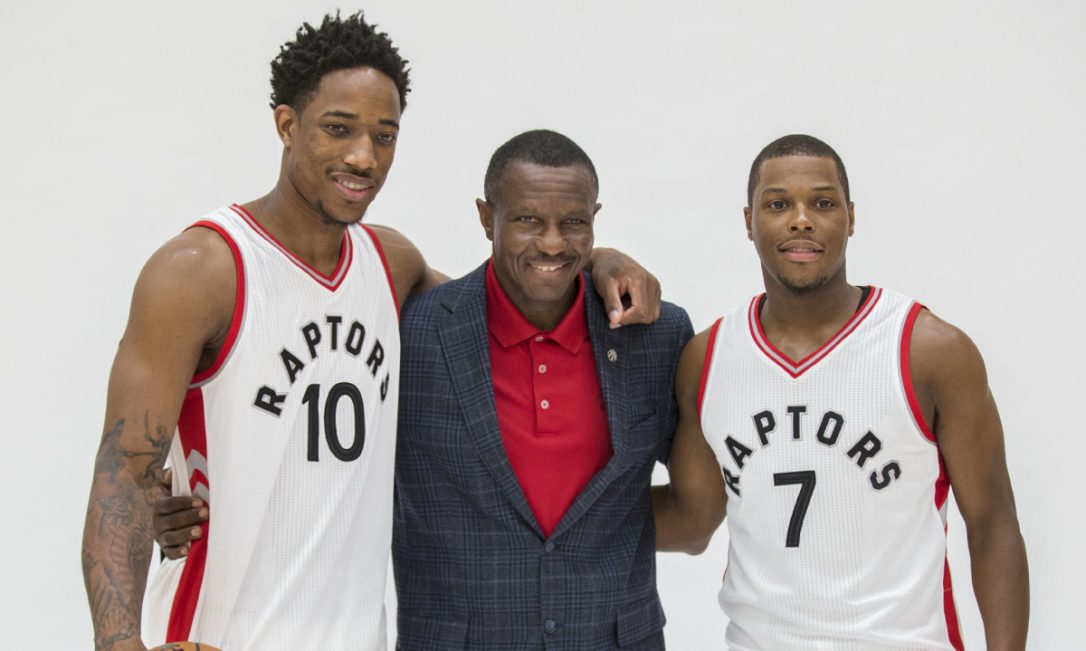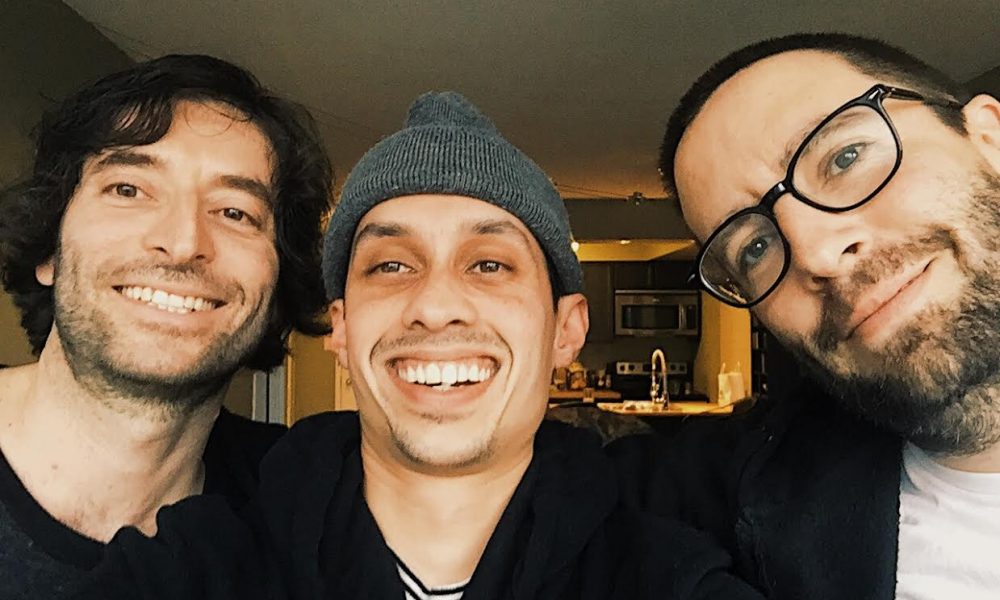The Toronto Raptors likely won’t be winning any awards come the end of the season. They have strong cases for a few different awards, but voters often value attributes that other candidates may boast in a higher quantity than the Raptors. So let’s give out some ¾ season awards just for the Raptors!
Most Valuable Raptor: DeMar DeRozan
DeRozan has separated himself this year from Kyle Lowry as the team’s leader. He is the offensive hub around whom all else is designed. He is the team’s unquestioned closer, attempting 73 clutch field goals to Lowry’s 34. With the game on the line (point differential ≤ 3, ≤10 seconds remaining), DeRozan has fired 7 of the team’s 9 attempts. The team lives and dies with DeRozan.
DeRozan has also made himself into the team’s best player in several regards. As a pick and roll ballhandler, he is the team’s best high-usage option, notching 0.94 points per possession (ppp) on such plays. This is an integral part of the Raptor’s offensive identity. He is deadly in transition, scoring 1.26 ppp while racing ahead of the crowd, which is the highest mark for a Raptor starter. He’s even made himself into a solid threat off the ball, as he is among the team leaders in scoring through cuts, handoffs, and off-ball screens. DeRozan has Dwayne Wade-isized himself, performing magic by creating some space off the ball for his teammates without being a knockdown 3-point shooter (though this is his career-best season in that regard).
Furthermore, DeRozan is as much the team’s point guard as Lowry. Though he hurls fewer passes per game with almost as many touches, he averages only slightly fewer assists (5.2 for DeRozan to 6.5 for Lowry). Ben Falk quite recently detailed how assist numbers are less descriptive than we would like, so let’s delve a little deeper. DeRozan records the highest percentage of passes that leads to assists on the team, which means that he is most often involved in the true offensive actions. He also averages the most secondary assists on the team, through which he often creates an open shot with a skip pass that leads to a short swing and an open jumper.
Of course, Lowry remains a far superior defender and shooter than DeRozan. His catch-all metrics remain better (though his offensive number is consistently worse). The Raptors cannot win without a healthy and successful Lowry, but DeMar DeRozan is the most valuable player on the Raptors.
Raptor Coach of the Year: Dwane Casey
Giving Casey the Raptors’ coach of the year award wasn’t as easy as you might think. The Raptors boast a terrific stable of coaches from top to bottom in the organization.
Jerry Stackhouse has performed miracles with the 905 this year. After winning the D-League championship last year because the 905 basically had an NBA team worth of talent, Stackhouse earned himself some buzz as a future NBA head coach. Despite losing almost every player from last year’s roster, then Edy Tavares and Kyle Wiltjer before the season began, and finally Bruno Caboclo at the trade deadline, the 905 have kept rolling this season. They’ve even endured long stretches without key players (and stars) to various FIBA appointments and injuries.
Regardless, the 905 have been a buzzsaw. Their defence is elite, and their offence is good enough. They play like the Boston Celtics: tear opponents limb from limb on defence, and rely to a comical extent on an all-league guard creating efficient shots every second he’s on the floor (Kyrie Irving for the Celtics, Lorenzo Brown for the 905). It’s worked, and Jerry Stackhouse has impressed even more than last season than last.
Dwane Casey has been better. This season has been a work of art for him, and his accomplishments were covered terrifically by Sahal Abdi here. He’s a stand-up human being (underrated quality), a terrific developer and enabler of talent, and an impressive offensive and defensive architect. The culture reset seemed impossible: keep the same players and the same coach, but make them play differently. Somehow, Dwane Casey has found a way to do the impossible.
Casey has improved at managing rotations and end-of-game playcalling (two criticisms in years past) as the season has progressed. He has cobbled together a top-5 defence without a single player considered an elite, lockdown defender at their position (before the season, now a few might be deserving of such high praise). He has the best chance at winning the Raptors a real end of season award, so I can’t in good faith give this make-believe award to anyone else.
Raptor Rookie of the Year: O.G. Anunoby
Anunoby is the Raptors’ only rookie, yes. He also would be a legitimate contender for the real rookie of the year award if this year’s draft class didn’t contain multiple hall of fame-caliber prospects. He’s outrageously deserving of the Raptors’ rookie of the year award, even if he has no competition.
Anunoby began the year on the bench, which lineup he helped mold into a powerhouse. As the all-bench power forward, Anunoby lifted the lineup of Fred VanVleet, Delon Wright, C.J. Miles, and Jakob Poeltl to a +16.8 net rating on the back of a ridiculous 88.8 points allowed per 100 possessions, per Cleaning the Glass.
As a starter, Anunoby has contributed to another powerhouse lineup (Lowry, DeRozan, Anunoby, Serge Ibaka, Jonas Valanciunas) with a net rating of +10.3. He has done it all by fitting in around the edges. He creates space in different ways for his teammates. He has been a passable shooter, hitting the 3 at 34.5% on the season, although he began the campaign shooting lights out. Furthermore, he is one of the league’s top-10 most effective cutters by ppp (1.67). He finishes well and smartly, is quick at reading and executing passes on the move, and he is a monster athlete. His skills mesh perfectly around Lowry and DeRozan.
On the defensive end? Well, let’s get to that in a moment…
Defensive Raptor of the Year: O.G. Anunoby
This award was one of the hardest for me to decide. Pascal Siakam has a legitimate claim to being the team’s top defender, as a result of his non-stop motor, multiple efforts, and quick feet on the perimeter. Jakob Poeltl has been a hyper-modern big on the defensive end, able to corral virtually any player (although he ironically struggles defending some players at his own position) and contest everything around the rim.
Anunoby may not force the number of turnovers or record the highlight blocks of his compatriots, but he has been a consummate team defender. Although he has occasional mental lapses (common for a rookie), Anunoby is almost never out of position on the defensive end. He executes gameplans fantastically, fighting over screens, recovering to his man, switching when necessary, staying in front of his marks, and contesting any shots taken in his vicinity.
Anunoby is always tasked with defending a team’s best player, 2-4. He has been baptised in the waters of lakes James Harden, LeBron James, and Michael Beasley. He has always come out dry on the other end. When facing Cleveland, the Raptors fixed Anunoby’s minutes to James’, except for a short stretch during the early second quarter when Siakam guarded LeBron. He is the team’s most important defender, and he’s always up for the challenge.
Most Improved Raptor of the Year: Pascal Siakam
Another tough one! Man, it’s almost like the Raptors have a good team. Jonas Valanciunas is deserving of this title, without a doubt. He has become far more consistent at his strengths: rebounding, finishing, setting screens, and rolling to the rim. He is more involved in the offence. He’s also found new ways to contribute, as he’s eliminated some of his weaknesses from years past.
Valanciunas has become a solid defender in every area of the court, including on the pick and roll, where he almost always drops to contain the rolling big, disallow penetration, and encourage a midrange jumper. He has the team’s second-best defensive rating in 2018, at 101.1. He’s even the team’s best marksman now?
However, Valanciunas was a good and important player for the Raptors in years past. He didn’t have as much to improve in the first place. Pascal Siakam, on the other hand, was one of the least effective Raptors last year. Despite starting, he was almost always outscored when on the court, and the Raptors traded for Serge Ibaka in part to fill the power forward hole that Siakam failed to plug himself.
Fast forward to this year, and Siakam is a more confident, effective, and talented player. He is launching 3s, which will make him a special player when they start falling. His handle and passing vision are already quite advanced for a player of his age and position, and they are only improving. He projects to grow into the release valve the Raptors need when Lowry and DeRozan draw half-court traps. He can drive, attack moving defenders, and finish or make passes. He can consistently make the right decision, which has enabled the Raptors to trust the ball in the hands of their non-stars.
On defence, he is no longer over-active and hectic. Instead, Siakam uses his motor and athleticism to dominate players at any position other than center (though the Raptors have trusted him there for short stretches). He defends the rim incredibly for a player of his size, holding players to 6.1% below their averages when attempting shots from fewer than 6 feet, comparable to Andre Drummond (-5.9%), Jonas Valanciunas (-6.7%), or Anthony Davis (-6.8%), per nba.com. He is quick enough to defend anyone on the court, including guards. Siakam can’t be kept off the court, as he’s improving at a rapid rate. Last year, the team was -11.0 points per 100 possessions worse with Siakam on the court compared to him on the bench. This year, the team is +2.3 points better, per Cleaning the Glass. That’s improvement of the highest order, and by far the largest jump on the team.
Most Valuable 6th Raptor of the Year: Fred VanVleet
This was perhaps the easiest award to give. Every Raptor bench player has a claim, as Poeltl, C.J. Miles, Delon Wright, and Siakam have all combined their talents to make the all-bench lineup the most dominant single lineup in the NBA. Fred VanVleet stands above them.
VanVleet has such an amazing narrative. We all know it, so let’s rehearse briefly: undrafted, training camp deal, plays his way onto roster, eventual success, closing player, (dot dot dot), (offseason) profit. Oh yeah, and he’s my size.
VanVleet has become one of the harbingers of Raptor success; when he’s on the court, the Raptors are much better than when he’s off (+12.0 pts last year and +9.7 pts this year). VanVleet may not be the best scorer himself, but the team’s offensive structure flows beautifully when he enters the game. Per Cleaning the Glass, the Raptors shoot far more at the rim and from behind the arc when VanVleet is playing.
His ability to shoot or initiate the offence means he can spread the floor for Lowry or DeRozan or even push them off the ball. This worked quite well at the end of a recent Minnesota game, when VanVleet’s initiation of the offence allowed the Raptors to win the game and play terrific clutch offence.
On the defensive end, VanVleet may not be physically imposing, but he’s smart and always in the right place. He switches seamlessly and tries hard, and those skills can’t be overrated. The defence is far better when VanVleet is playing, no matter who his teammates may be; he has the team’s lowest defensive rating on the season, at 98.0.
VanVleet is the Raptor’s 6th man like Manu Ginobili was for the Spurs. He improves the team whenever he plays (which isn’t true of all award winners) and could easily start. He’s the Raptor’s most impactful bench player on the season.



